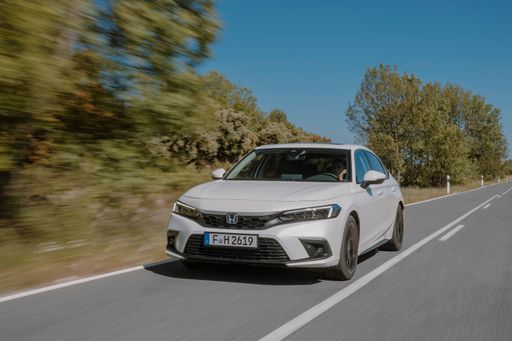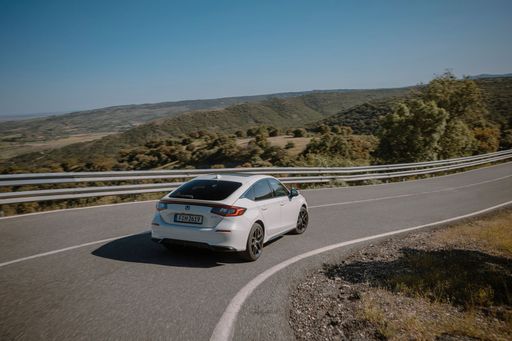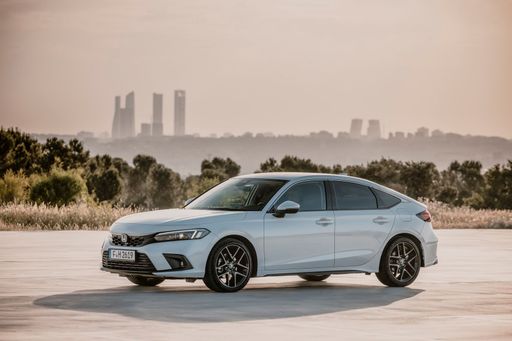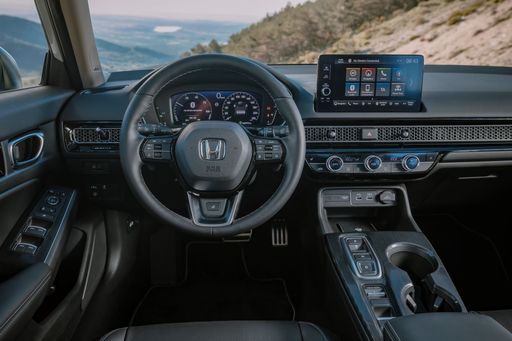Honda Civic VS Nissan Leaf – Specs, Efficiency & Price Comparison
Which model is the better choice – the Honda Civic or the Nissan Leaf? We compare performance (329 HP vs 217 HP), boot capacity (410 L vs 394 L), efficiency (4.70 L vs 16.70 kWh), and of course, the price (33900 £ vs 30800 £).
Find out now which car fits your needs better!
The Honda Civic (Hatchback) is powered by a Full Hybrid or Petrol engine and comes with a Automatic or Manuel transmission. In comparison, the Nissan Leaf (Hatchback) features a Electric engine and a Automatic gearbox.
When it comes to boot capacity, the Honda Civic offers 410 L, while the Nissan Leaf provides 394 L – depending on what matters most to you. If you’re looking for more power, you’ll need to decide whether the 329 HP of the Honda Civic or the 217 HP of the Nissan Leaf suits your needs better.
There are also differences in efficiency: 4.70 L vs 16.70 kWh. In terms of price, the Honda Civic starts at 33900 £, while the Nissan Leaf is available from 30800 £.
Compare all the key specs now and find out which model fits your lifestyle best!
Honda Civic
The Honda Civic has long been celebrated for its blend of reliability and style, making it a popular choice among drivers who value both aesthetics and performance. With its sleek design and spacious interior, the Civic offers a comfortable ride for both city commuting and longer journeys. The car's efficient engine ensures a smooth and responsive driving experience, while its advanced technology features cater to the needs of modern motoring enthusiasts.
details @ hondanews.eu
@ hondanews.eu
 @ hondanews.eu
@ hondanews.eu
 @ hondanews.eu
@ hondanews.eu
 @ hondanews.eu
@ hondanews.eu
Nissan Leaf
The Nissan Leaf stands out as a pioneering model in the realm of electric vehicles, known for its impressive blend of practicality and eco-friendliness. It offers a smooth and quiet driving experience, making it an ideal choice for city commuting and longer journeys alike. The interior design is both comfortable and intuitive, providing drivers with a sense of modernity and ease of use.
details @ germany.nissannews.com
@ germany.nissannews.com
 @ germany.nissannews.com
@ germany.nissannews.com
 @ germany.nissannews.com
@ germany.nissannews.com
 @ germany.nissannews.com
@ germany.nissannews.com

|

|
|
|
|
Costs and Consumption |
|
|---|---|
|
Price
33900 - 56500 £
|
Price
30800 - 37200 £
|
|
Consumption L/100km
4.7 - 8.2 L
|
Consumption L/100km
-
|
|
Consumption kWh/100km
-
|
Consumption kWh/100km
16.7 - 17.8 kWh
|
|
Electric Range
-
|
Electric Range
270 - 385 km
|
|
Battery Capacity
-
|
Battery Capacity
39 - 59 kWh
|
|
co2
108 - 186 g/km
|
co2
0 g/km
|
|
Fuel tank capacity
40 - 47 L
|
Fuel tank capacity
-
|
Dimensions and Body |
|
|---|---|
|
Body Type
Hatchback
|
Body Type
Hatchback
|
|
Seats
4 - 5
|
Seats
5
|
|
Doors
5
|
Doors
5
|
|
Curb weight
1480 - 1533 kg
|
Curb weight
1580 - 1756 kg
|
|
Trunk capacity
404 - 410 L
|
Trunk capacity
385 - 394 L
|
|
Length
4551 - 4594 mm
|
Length
4490 mm
|
|
Width
1890 mm
|
Width
1788 mm
|
|
Height
1401 - 1408 mm
|
Height
1540 - 1545 mm
|
|
Payload
320 - 397 kg
|
Payload
384 - 415 kg
|
Engine and Performance |
|
|---|---|
|
Engine Type
Full Hybrid, Petrol
|
Engine Type
Electric
|
|
Transmission
Automatic, Manuel
|
Transmission
Automatic
|
|
Transmission Detail
Schaltgetriebe
|
Transmission Detail
Reduction Gearbox
|
|
Drive Type
Front-Wheel Drive
|
Drive Type
Front-Wheel Drive
|
|
Power HP
184 - 329 HP
|
Power HP
150 - 217 HP
|
|
Acceleration 0-100km/h
5.4 - 8.1 s
|
Acceleration 0-100km/h
6.9 - 7.9 s
|
|
Max Speed
180 - 275 km/h
|
Max Speed
144 - 157 km/h
|
|
Torque
315 - 420 Nm
|
Torque
320 - 340 Nm
|
|
Number of Cylinders
4
|
Number of Cylinders
-
|
|
Power kW
135 - 242 kW
|
Power kW
110 - 160 kW
|
|
Engine capacity
1993 - 1996 cm3
|
Engine capacity
-
|
General |
|
|---|---|
|
Model Year
2025
|
Model Year
2019
|
|
CO2 Efficiency Class
C, G
|
CO2 Efficiency Class
A
|
|
Brand
Honda
|
Brand
Nissan
|
Honda Civic
Innovative Elegance: The Honda Civic
The Honda Civic, a longstanding favourite in the automotive world, continues to impress with its blend of cutting-edge technology, stylish design, and outstanding performance. The latest iterations of this iconic vehicle showcase Honda's commitment to innovation and excellence, making them a top choice for those seeking both efficiency and excitement.
Powertrain and Performance
At the heart of the Honda Civic lies a range of powerful yet efficient engines. With options like the full-hybrid system producing up to 184 PS and a maximum torque of 315 Nm, drivers can enjoy a robust driving experience. For those seeking even more thrill, the Type R variant offers a staggering 329 PS, propelling the Civic from 0-100 km/h in as little as 5.4 seconds.
Front-wheel drive and advanced transmission options, including CVT and manual gearboxes, ensure that the Honda Civic provides a dynamic and responsive ride, whether you're navigating city streets or open motorways.
Fuel Efficiency and Sustainability
The Honda Civic boasts impressive fuel efficiency, with consumption figures as low as 4.7 L/100 km for the hybrid models, making it an eco-friendly choice without sacrificing performance. With CO2 emissions starting from 108 g/km, the Civic achieves a commendable balance between power and environmental responsibility, appealing to conscientious drivers.
Design and Dimensions
With sleek lines and a striking profile, the Honda Civic stands out in the hatchback segment. Measuring between 4551 mm and 4594 mm in length, with a width of 1890 mm and a height of 1401 mm to 1408 mm, the Civic offers both aesthetic appeal and practicality. The spacious interior accommodates four to five passengers comfortably, while a boot capacity of up to 410 litres provides ample space for luggage and belongings.
Advanced Technology and Features
The Honda Civic is equipped with a plethora of advanced features designed to enhance the driving experience. From state-of-the-art infotainment systems to comprehensive safety technologies, the Civic ensures comfort, connectivity, and peace of mind on every journey. Available in multiple trim levels, such as Elegance e-CVT, Advance e-CVT, and Sport e-CVT, the Civic caters to a variety of preferences and demands.
Cost of Ownership
With monthly costs ranging from €1,033 to €1,672 and a per-kilometre expense of 41.3 to 66.9 cents, the Honda Civic remains an economical choice for long-term ownership. The diverse range of models and trim levels ensures there is a Civic to suit every budget and requirement, making it a wise investment for both individuals and families.
Conclusion
The Honda Civic continues to set benchmarks in its class, combining performance, efficiency, and a suite of modern features in one sleek package. Whether you're drawn to its hybrid efficiency or the raw power of the Type R, the Civic delivers on all fronts, reaffirming its status as a beloved classic in the modern automotive landscape.
Nissan Leaf
Introduction to the Nissan Leaf: A Pioneer in Electric Mobility
The Nissan Leaf has established itself as a trailblazer in the realm of electric vehicles (EVs) since its launch. As we delve into its present-day iterations, the Leaf continues to soar in popularity due to remarkable advancements in technology and sustainability. Let's explore what makes the Nissan Leaf a standout in today's automotive market.
Power and Performance: Under the Hood of the Nissan Leaf
The Nissan Leaf boasts a power output ranging from 150 to 217 PS, depending on the battery option chosen. The vehicle's electric motor, a product of cutting-edge engineering, offers instant torque ranging from 320 to 340 Nm, resulting in impressive acceleration capabilities. The 0 to 100 km/h dash is achieved in as little as 6.9 seconds, showcasing its prowess in electric performance.
Battery Technology: Efficient Energy Management
When discussing the Nissan Leaf, battery technology is at the forefront. The available battery capacities range from 39 to 59 kWh, supporting an electric range between 270 to 385 km. This flexibility allows drivers to choose a model that best fits their driving habits, providing peace of mind for longer journeys without frequent recharging.
Sustainability: The Environmental Edge
One of the primary attractions of the Nissan Leaf is its commitment to sustainability. As an all-electric vehicle, it produces zero CO2 emissions, placing it in the top tier of the CO2-efficiency class with an 'A' rating. This clean energy approach contributes significantly to reducing environmental impact and supports Nissan's drive towards a greener future.
Design and Comfort: Aesthetic Appeal and Practicality
The Nissan Leaf is not just about efficiency; it's also designed for comfort and utility. With its sleek hatchback body and dimensions of 4490 mm in length, 1788 mm in width, and a height of up to 1545 mm, it offers ample interior space. The boot capacity ranges from 385 to 394 litres, providing sufficient storage for everyday needs. The model accommodates five passengers comfortably, ensuring a pleasant ride for everyone.
Innovations and Safety: Advanced Features for Peace of Mind
Nissan equips the Leaf with an array of intelligent features that enhance safety and convenience. The available equipment lines, including N-CONNECTA, Tekna, e+ N-CONNECTA, and e+ Tekna, offer varying levels of technology integration. ProPILOT Assist, e-Pedal, and a comprehensive suite of driver-assistance technology are just a few examples that highlight Nissan's commitment to innovation in the EV market.
Conclusion: The Nissan Leaf Continues to Lead
With prices ranging from €35,900 to €43,400, the Nissan Leaf remains an attractive choice for those looking to embrace electric mobility. It perfectly balances performance, design, and sustainability, making it a compelling choice in the competitive EV landscape. The Nissan Leaf not only represents the future of driving but also reinforces why it continues to be a leader in the electric vehicle community.
The prices and data displayed are estimates based on German list prices and may vary by country. This information is not legally binding.
